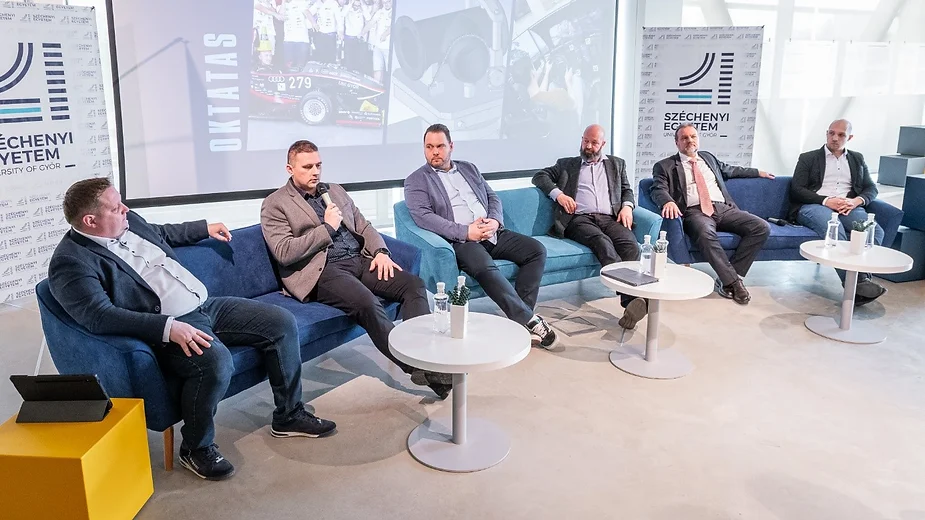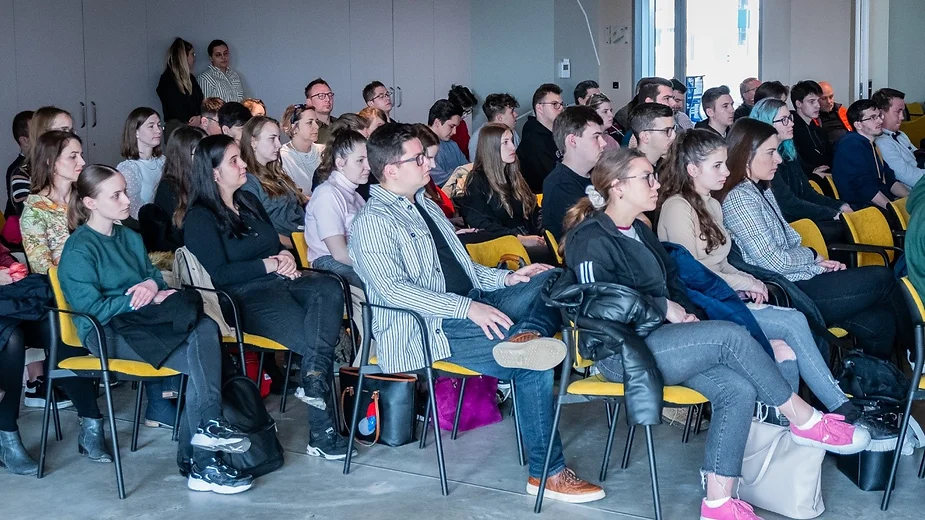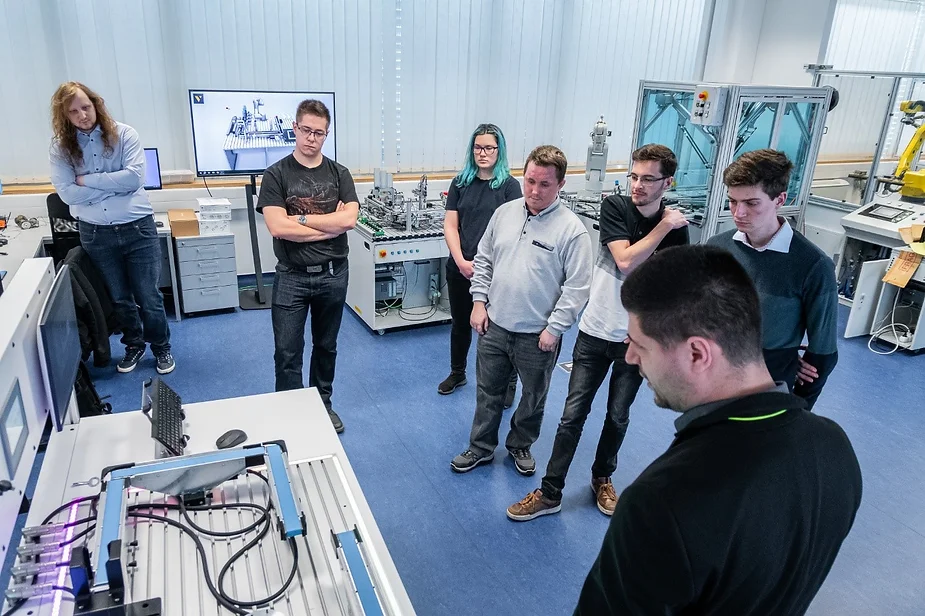The role of industry 4.0 and industry 5.0, modern technologies and their incorporation into education, and the innovative activities of Széchenyi István University were in focus during a programme on the Győr campus on 6 March. In the framework of the national Smart Manufacturing Festival not only the Innovation Park in Győr, but also the laboratories of the institution were opened to the public.
„SmartManFest was launched by the Industry 4.0 National Technology Platform Association (abbreviated as NTPSZ in Hungarian) to give the ones interested an insight into the activities of large Hungarian industrial enterprises, small and medium-sized enterprises, higher education institutions and research institutes in the field of industrial digitalisation. The initiative was joined by Széchenyi István University, which focuses on innovation and technological innovations”, dr. Ákos Kovács, Head of the Operations Division of the University’s Digital Development Centre said at the round table discussion held as part of the event in the recently completely renewed former biscuit factory building in Győr Innovation Park.

The participants of the SmartManFest roundtable discussion held at Széchenyi István University: dr. Ákos Kovács, Head of the Operations Division of the University’s Digital Development Centre; Norbert Szántó, Head of the Institute’s Cyber-Physical Manufacturing Systems Laboratory; dr. Szabolcs Szalai, Vice-dean of Education of Audi Hungaria Faculty of Automotive Engineering; dr. Áron Ballagi, Head of the Department of Automation and Mechatronics; dr. Dénes Fodor, Head of the Department of Power Electronics and Electrical Drives and Balázs Lukács, Development Division Manager of the ICT of the Digital Development Centre (Photo: Máté Dudás)
Norbert Szántó, Head of the Institute’s Cyber-Physical Manufacturing Systems Laboratory, shed light on the difference between Industry 4.0 and Industry 5.0.
„While in the former, networking and digitalisation aim to automate operations without human intervention, in the latter, the focus is back on people, and modern technologies such as artificial intelligence are used to support their work”, he said.
The expert also referred to the concept of process-based digital twins, also used at Széchenyi István University, where the physical production cell and its digital model communicate with each other to enable easy and fast intervention. This method is exemplified by the unique educational platform developed by the staff of the institution which illustrates the two-way interaction between the physical and digital worlds.
Balázs Lukács, Development Division Manager of the ICT of the Digital Development Centre, described the introduction of new technologies as a step-by-step process and the need for expertise. As he said, it takes years between the emergence of an innovation and its spread, because the conditions for its application need to be created.
„The achievements of Industry 4.0 were first spread to large enterprises, but now they are also spreading to small and medium-sized enterprises”, he said.
Great interest was shown in the programme organised in the Győr Innovation Park.

(Photo: Máté Dudás)
Dr. Szabolcs Szalai, Vice-dean of education at Audi Hungaria Faculty of Automotive Engineering, joined the question of expertise, and spoke about how Széchenyi University can provide its students with the latest knowledge.
„The knowledge required in the economy is constantly changing. This is why our institution involves industrial players in education, students can participate in joint projects with companies, work on real market issues in their thesis, and further deepen their practical knowledge in the university’s laboratories”, he explained.
Dr. Áron Ballagi, Head of the Department of Automation and Mechatronics, highlighted that students need a strong foundation of traditional knowledge, and on top of that they can build the new knowledge and the special knowledge that will enable them to become experts in a particular field. As an example, the head of the department mentioned robotisation, where theoretical knowledge can be deepened through project-based education and practical tasks.
Dr. Dénes Fodor, Head of the Department of Power Electronics and Electrical Drives, argued that the disciplines in university education should be integrated because the fields of sciences are increasingly converging.
„The scientist takes things apart to study them and the engineer puts them together to make them work. So it’s not enough for practitioners to understand the phenomena, they also need to be creative in order to innovate”, he added.
At the roundtable discussion, the speakers touched upon several areas of research at Széchenyi István University: in addition to digitalisation and robotics, they also discussed ICT, 5G, robotisation and self-driving vehicles. During the day, the visitors had the opportunity to get a glimpse of the work of the laboratories on the Győr campus, and to learn about the activities of the Cyber-Physical Manufacturing Systems Laboratory, the Radio Frequency Testing Laboratory, the Telecommunications Informatics Laboratory, the Drone Laboratory and the Mobilis Interactive Experience Centre.
Visitors could also see a unique educational innovation of Széchenyi István University in the Cyber-Physical Manufacturing Systems Laboratory.

(Photo: Máté Dudás)
„I came to the event to learn about the opportunities open to students. I am interested in modern technologies, especially artificial intelligence and 3D design, and I would like to work with the latter in the long term”, Balázs Sebők, a first-year mechanical engineering student from Székesfehérvár said in response to our question. He added that he is pleased to see that the institution has a number of programmes to help students, giving them the opportunity to get involved in the world of innovation.






